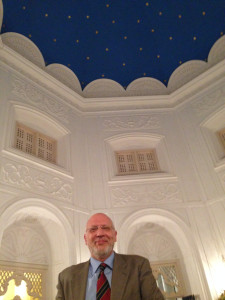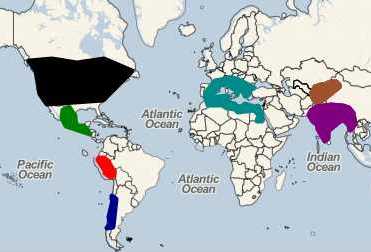- Intergovernmental Platform on Biodiversity and Ecosystem Services documents examples of how indigenous people’s knowledge conserves biodiversity, including of the agricultural kind.
- The truth about frankincense and myrrh. Talk about traditional knowledge.
- Can global crop production meet future demands? The Story Map.
- What ICRISAT is doing about the above, from the horse’s mouth.
- Progress in Achieving and Delivering Drought Tolerance in Maize — An Update: “Germplasm collections are assuming greater importance if gains from native genes are to be sustained. Efficient and accurate field phenotyping remains essential for genetic progress.”
- Workshop in Field-based High Throughput Phenotyping. Next April, in Arizona, you maize people.
- A clone is a clone is… no wait.
- Root and tuber people already planning their next big shindig, in October 2015. Meanwhile, they’re getting down to work in the Pacific.
- AoB Blog on plant science on Facebook. Also on Facebook.
- Solanum expert Dr Sandy Knapp on the of Global Plants Initiative.
- Archaeological remains of agriculture found in Nuevo Leon are oldest for that Mexican state.
- Legumes (genera) of the world now online, thanks to Kew.
How dirty might a mulberry garden have been?
Luigi’s earlier item on HM The Queen’s mulberry collection jogged a few memories loose. Like John Evelyn’s famous mulberry down in Deptford, often erroneously associated with Peter the Great.
Search for “John Evelyn mulberry,” however, and the top item is likely to be this well-worn quote from his diaries:
“Mulberry Garden, now the only place of refreshment about the town for persons of the best quality to be exceedingly cheated at.”
That doesn’t sound right for a royal orchard, but if, as instructed by Luigi, you read the full story of those mulberries, you might have been intrigued by one sentence:
The Mulberry Garden itself was in existence for a number of years and latterly became a pleasure ground before being swept away in the rebuilding of the house.
A pleasure ground? Ah, now we’re getting somewhere on the cheating front. Further searching, however, reveals little more of interest. There’s a Restoration comedy by Sir Charles Sedley, which Samuel Pepys didn’t think much of. Nor did he think much of the garden itself (which his modern-day amanuensis seems unable to locate).
James’ mulberry garden was planted after 1609. The Mulberry Garden was first performed in 1668. In the meantime, the plot to build a silk empire had failed. And by 1649 one Clement Walker, in his Anarchia Anglicana: or the history of independency, refers to “new-erected sodoms and spintries at the Mulberry Garden at S. James’s”.
Just the place for a person of the best quality to be exceedingly cheated.
Nibbles: Homegardens, Ancient grains, Homeless hens, Data data data, New maize, ICRISAT ambassadors, Wine microbes, India, Soil Day
- Emma Cooper blogs her ethnobotanical MSc dissertation on British homegardeners and their cool crops.
- If she’d done her work in Sweden, she’d have written about Ragnar Pettersson and his “treasure of Ardre.”
- The downside of backyard farming: homeless hens.
- International e-Conference on Germplasm Data Interoperability: Genebank Database Hell gets an e-conference. What could possibly go wrong.
- Apparently there’s a new way to search for agricultural bibliografic (sic) data.
- CIMMYT gets its maize out there.
- ICRISAT is not one to hide its light under a bushel either.
- Aussies to survey their yeasts and bacteria to improve winemaking.
- The problems of India: “It takes a particular brand of incompetence and neglect for decades of stellar growth to have no apparent impact on India’s sky-high levels of under-nutrition.” I bet Dreze and Sen didn’t include a food bubble. Hey, but that can be exported.
- Oh and happy World Soil Day! Thanks to it, and Jim Croft, I now know Australia has a sort of soil genebank.
Nibbles: EU rules, Squash, Potato, Agroforestry textbook, Wine for health, Ag history, Breeding stories, Food security reports, Talking to policymakers
- Plants for Europe is (are?) incensed about new EU regulations. Should it/they be?
- Squash is a Native American word, natch. I bet they’re incensed.
- Speaking of Native American crops, here’s a big writeup on the potato, including great pix, and nice shoutout for the CIP genebank.
- If you live in the tropics and want to learn about agroforestry, you could just go out and talk to the first smallholder you meet. Or you could read a textbook.
- A roundtable on whether genetics can help us figure out whether wine is good for you. When they do the large scale clinical trial, as they surely must, I’ll be first in line.
- The breakthroughs of agriculture. Sadly, working out the seed viability equation does not feature. Nor does vegetarianism.
- Breeding does, though. And here’s an example why, featuring soybeans.
- And another from rice: IRRI bags another silver bullet gene.
- And we’ll soon have those in cotton too.
- Which is all fully recognized in the latest WRI report on how to feed the world.
- Though not in this other mega-report on Brazil, at least not quite so explicitly.
- “We need more research” is the wrong answer. Even when it’s breeding?
Food globalization under Mowbray’s Cupola
 One of the highlights of my recent trip to India was dinner with Prof. Swaminathan and some of his colleagues at the Madras Club. That’s me under the club’s famed 18th century cupola. The Madras Club is reputed to be the birthplace of mulligatawny soup, so I was planning a post showing how this quintessentially Indian concoction illustrates global interdependence in food products, complete with map of the worldwide origin of the ingredients. A map like this.
One of the highlights of my recent trip to India was dinner with Prof. Swaminathan and some of his colleagues at the Madras Club. That’s me under the club’s famed 18th century cupola. The Madras Club is reputed to be the birthplace of mulligatawny soup, so I was planning a post showing how this quintessentially Indian concoction illustrates global interdependence in food products, complete with map of the worldwide origin of the ingredients. A map like this.
But it was Italian night, and I had minestrone.
